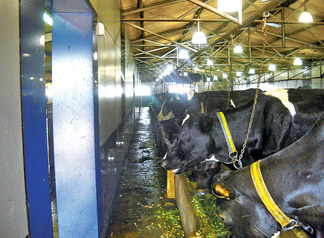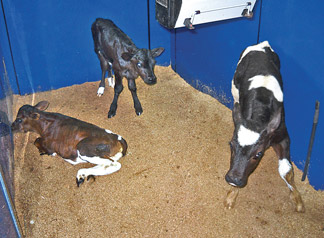|
Dairy farming, eucalyptus plantations among options:
Tea industry goes for innovations
by P.Krishnaswamy

The hybrid cows in the dairy farm |

The triplet calves |
One and a half century-old tea industry is now in strains due to
competition from other tea producing countries, erratic and
unpredictable climatic conditions, high production costs and
discouraging price fluctuations in the international tea auctions. Some
of the innovative Regional Plantation Companies (RPCs) have introduced
other projects, mainly dairy farming, in some of their estates as
additional source of revenue to offset overheads.
The Sunday Observer staffer visited Lonach Estate in Watawala, an
estate under the management of the Watawala Plantations where a Dairy
Farm is in operation as a successful corporate venture for the last
three years with 200 head of milch cows, modern machinery for milking,
chillers, a compost site and a small bio-gas project as part of the
dairy farm project. The popular Zesta Tea and 'Watawala Kahata' are
products of the Watawala Plantations.
Manager of Lonach Estate A. Jayaram said that he is managing the
dairy farm under the able guidance of Project Manager Govindasamy
Krishnamoorthy who is well-qualified and has the expertise on such
projects.
A special variety of grass, the CO 03 Grass, is being grown in an
extent of 25 hectares for the cattle. They get an average of 1500 litres
of milk per day, Jayaram said.
Their chillers have the capacity to preserve 5000 litres of milk. He
was exhilarated in showing the triplet calves given birth by one of
their cows recently and said that there had never been a birth of
triplet calves recorded in the history of Sri Lanka.
The Department of Animal Production and Health along with the
Provincial Director, Central Province, congratulated the Lonach farm
management team on this rare occurrence, he said. Other details as
apprised by the Estate Manager were:
The Bio-Gas project commissioned in December last year produces
enough gas for operating the farm machinery and the exhaust fans.
At the compost site located in land with 10 acres in extent, they
produce 1000 kg of organic fertilizer per day. They use it for their tea
plantations under the 'forking and applying' process while also
supplying the excess to other estates. Cow dung, dust tea, and other
waste material are used for producing fertiliser using chopper machines.
Of the total workforce of 350, about 80 are employed in the dairy
farm while the rest are in the tea sector. The fertiliser slurry is
pumped to plants and grass to save on other fertilisers.
On the estate they also have 15 hectares of eucalyptus trees for
timber purposes and and 30 hectares of other trees for firewood fuel.
Re-planting of tea is also being done in the estate at the rate of
two hectares per year to maintain the stability of tea. |

